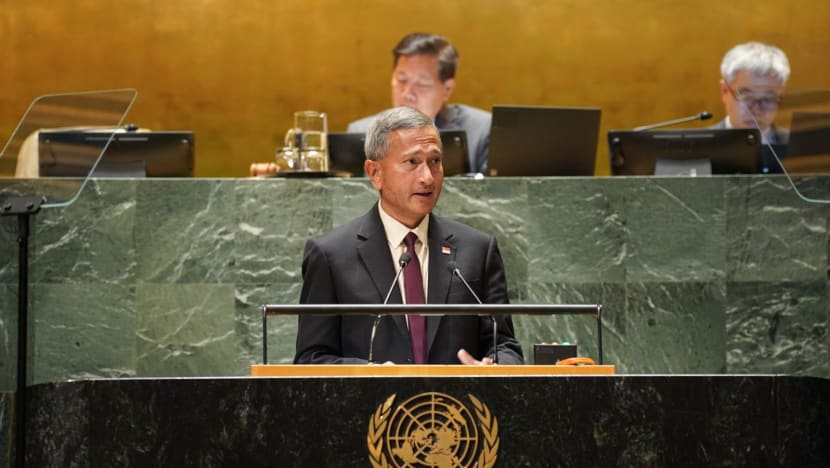World must prepare for ‘profound implications’ of AI and distribute its benefits fairly: Vivian Balakrishnan
“There will be many occasions when humans may not even be in the firing loop, but we will be on the firing line,” said the Foreign Affairs Minister, on AI-enabled weapons systems.

Foreign Affairs Minister Vivian Balakrishnan delivers Singapore's national statement at the 78th session of the United Nations General Assembly in New York on Sep 22, 2023. (Photo: Ministry of Foreign Affairs)
SINGAPORE: In the midst of the digital revolution and the advent of artificial intelligence (AI), the world must prepare for the associated risks and distribute the benefits fairly, said Minister for Foreign Affairs Vivian Balakrishnan at the United Nations General Assembly (UNGA) in New York on Friday (Sep 22).
Generative AI like ChatGPT has captured the popular imagination in the past year, but the world is “already on the verge” of the next stage of the technology – AI agents that can negotiate and transact with each other and humans, he added.
“This has profound implications on all our societies, on our politics and our economies everywhere. And autonomous weapon systems without human fingers on the triggers are already with us,” he said, delivering Singapore’s national statement at the 78th session of the UNGA.
Quoting UN Secretary-General Antonio Guterres’ words at the opening of the UNGA this week, Dr Balakrishnan stressed that while generative AI “holds much promise”, it may also lead the world “into more danger than we can control”.
“This is especially so in the theatre of war and peace,” he continued, adding that AI will disrupt assumptions on military doctrines and strategic deterrence.
For example, since AI-enabled weapons systems can be deployed and triggered almost instantly, decision times for leaders would be dramatically reduced, said Singapore’s Foreign Affairs Minister.
“There will be many occasions when humans may not even be in the firing loop, but we will be on the firing line. This would inevitably heighten the risks of unintended conflicts or the escalation of conflicts,” he added.
During the Cold War, the sense of mutually assured destruction imposed mutual restraint, although there were several close shaves, said Dr Balakrishnan.
“This spectre of nuclear escalation has not disappeared. And yet the advent of artificial intelligence in conflict situations has actually increased the risks exponentially,” he added.
“We must start an inclusive global dialogue, and we must start it at the United Nations. We need to urgently consider the oversight of such systems and the necessary precautions to avoid miscalculations.”
Singapore welcomes the decision to convene the High-Level Advisory Body on AI to explore these issues and is optimistic that the UN and the multilateral system will be “up to the task” of establishing norms on these fast-emerging technologies, said the Foreign Affairs Minister.
“The reality is that many nations are not ready for the wave of digital transformation sweeping our world. We should not forget that, even today, more than 2 billion people still have no internet access. And we need to work far harder to bridge that digital divide,” he continued.
Also read:
In delivering Singapore’s statement to the UNGA on Friday, Dr Balakrishnan also said that countries should reaffirm their commitment to building a multilateral system that reflects their “enlightened long-term interests as a global community”.
“The world today is marked by even sharper geopolitical rivalry, free trade is in retreat and supply chains are being fragmented,” he added.
“This unravels the gains that we have painstakingly made over many decades by competing and contributing to a common global technology stack.”
Countries must “avoid turning competition into a zero-sum game”, Dr Balakrishnan continued.
“Whether we are addressing climate change, outer space or technology standards, it is important for all countries to balance (their) national interests with the collective long-term interests of our global community.”
UN member states should also accept and respect the diversity of experiences, systems and ideas within the multilateral system, which come from a range of cultures, religions and societal norms, said Dr Balakrishnan.
“We must recognise that there is no one-size-fits-all template for how a country should organise itself,” he added.
“No one has a monopoly on culture or wisdom, and we should resist the arrogant temptation to remake others in our own image.”
Also read:
“SOMEWHAT SOMBRE” MOOD
Speaking to journalists in a doorstop interview over Zoom after his speech at the UNGA, Dr Balakrishnan described the mood at the meeting as “somewhat sombre” due to multiple ongoing crises.
The war in Ukraine continues with no sense that the conflict will end any time soon, the effects of the COVID-19 pandemic still linger and the world is “clearly behind” on its sustainable development goals, he noted.
“It sets a mood that this is a world beset with multiple problems which need global leadership and solutions where all countries pull together,” he said.
“But because of distractions, because of conflict, because of rivalry, there’s this gnawing anxiety that the world will not be able to get its act together.”
The issue of AI captured attention at this year’s UNGA, he said, reiterating his call for global, multilateral rules, regulations, standards and norms on the matter.
“The first problem is that if there is intense competition, particularly viewed in zero-sum games, then it’s very hard to get all the players to sit down in the same room and arrive at the appropriate compromises, and a level of transparency and good faith and trust, in order to generate these rules,” he added.
Where autonomous weapon systems are concerned, competition may veer into confrontation, where there is insufficient trust to build the “appropriate guardrails”, said Dr Balakrishnan.
“If we can get together and achieve some safety guidelines and … have enough transparency so that people know what the other side is doing, and they also know what precautions both sides can take ... at least you avoid accidental wars or unnecessary escalations,” he added.
“Then you can get a somewhat safer world.”














